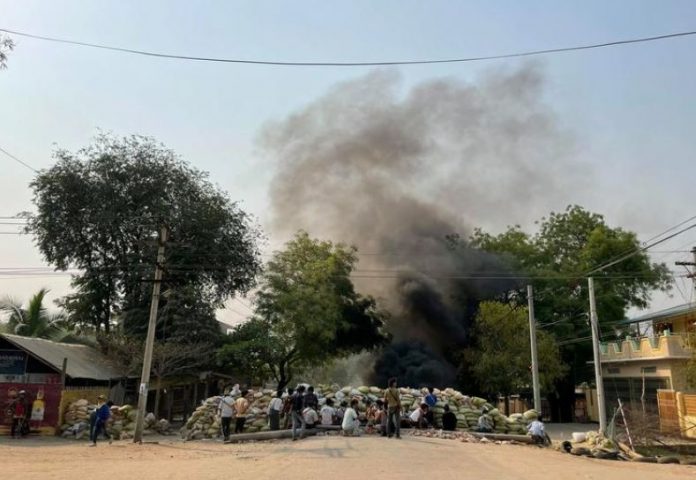Myanmar security forces opened fire on pro-democracy protests on Saturday killing at least five people, a protester and media said, as the military reinforced its bid to end dissent with arrest warrants for online critics and internet blocks.
Despite the killing of more than 550 people by the security forces since the Feb. 1 coup, protesters are coming out every day, often in smaller groups in smaller towns, to voice opposition to the reimposition of military rule.
Security forces in the central town of Monywa, which has seen big protests day after days for weeks, fired on a crowd killing at least four people and wounding several, two media organisations said.
“They started firing non-stop with both stun grenade and live rounds,” the protester in Monywa, who declined to be identified, told Reuters via a messaging app.
“People backed off and quickly put up … barriers but a bullet hit a person in front of me in the head. He died on the spot.”
One man was shot and killed in the southern town of Thaton, the Bago Weekly Journal online news portal and residents reported. Police also fired in the central town of Bago, wounding one man.
Police and a spokesman for the junta did not answer telephone calls seeking comment.
The Assistance Association for Political Prisoners activist group, in a statement earlier in the day, said the security forces had killed 550 people, 46 of them children, since the military overthrew an elected government led by Aung San Suu Kyi.
The demonstrations that drew tens of thousands of people in the early days of defiance in big cities have become more rare with opponents of the coup adopting “guerrilla rallies” – small, quick shows of defiance before security forces can respond.
People also gather at night for candle-lit vigils.
“People are still protesting every day because we believe strongly that this is a fight between good and evil,” protest leader Tayzar San said in an audio message to Reuters.
The authorities are also waging a campaign to control information. They had shut down mobile data and on Friday ordered internet providers to cut wireless broadband, depriving most customers of access, though some messages and pictures were still being posted and shared on social media.
Authorities issued warrants for 18 celebrities, including social media influencers and two journalists, under a law against material intended to cause a member of the armed forces to mutiny or disregard their duty, state media reported late on Friday. The charge can carry a prison term of three years.
Actress Paing Phyoe Thu, regularly attended rallies in the main city of Yangon in the weeks after the coup, said she would not be cowed.
“Whether a warrant has been issued or not, as long as I’m alive I’ll oppose the military dictatorship who are bullying and killing people. The revolution must prevail,” she said on Facebook.
Her whereabouts were not immediately known.
SILENCING THE VOICES?
State broadcaster MRTV announced the warrants for the 18 with screenshots and links to their Facebook profiles.
While the military has banned platforms like Facebook, it has continued to use social media to track critics and promote its message.
The United States condemned the internet shutdown.
“We hope this won’t silence the voices of the people,” a State Department spokeswoman, Jalina Porter, told a briefing.
The United States and other Western countries have denounced the coup and called for the release of Suu Kyi, who won the Nobel Peace Prize in 1991 for her campaign against military rule. She has been charged with violating an official secrets act that is punishable by up to 14 years in prison.
The coup has rekindled old wars with autonomy-seeking ethnic minority forces in the north and the east.
Myanmar’s oldest insurgent group, the Karen National Union (KNU), has seen the first military air strikes on its forces in more than 20 years, after it announced its support for the pro-democracy movement.
The KNU, which signed a ceasefire with the government in 2012, said more than 12,000 villagers had fled their homes because of the air strikes. It called for an international embargo on arms sales to the military.
Media has reported that about 20 people were killed in air strikes in KNU territory in recent days, including nearly a dozen at a gold mine run by the group.
Fighting has also flared in the north between the army and ethnic Kachin insurgents. The turmoil has sent several thousand refugees fleeing into Thailand and India.
Source : Reuters
















